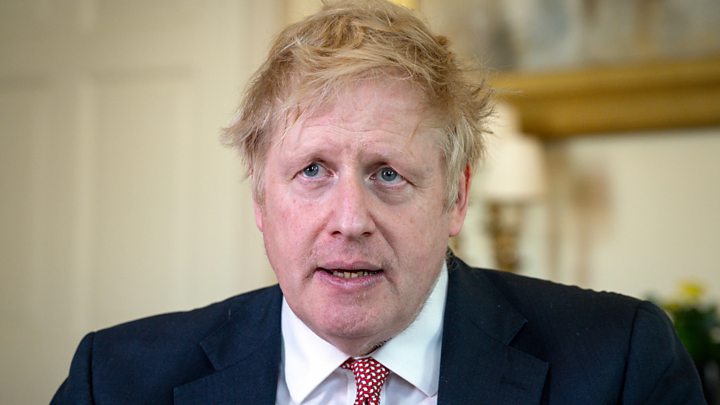Image copyright
Getty Images
Ministers urged the public to stay at home as much as possible over the Easter bank holiday weekend, despite warm and sunny weather across the UK
The UK is facing its fourth week in lockdown, with the government set to review by Thursday whether social distancing measures can be changed.
Ministers are required by law to assess whether the rules are working, based on expert advice, after three weeks of telling Britons to stay at home.
On Sunday, the UK’s total number of hospital deaths reached 10,612.
It comes as Boris Johnson thanked NHS staff after being discharged from hospital on Sunday.
Mr Johnson had spent a week at St Thomas’ Hospital in London – including three nights in intensive care – where he was being treated for Covid-19 – the disease caused by the coronavirus.
It is unclear whether the prime minister – who is now recuperating at Chequers, his country home in Buckinghamshire – will take part in the review.
In a video message to the nation recorded after he left hospital, 55-year-old Mr Johnson said it “could have gone either way” as he thanked NHS staff for saving his life.
Image copyright
Jenny McGee
Ms McGee is back at St Thomas’ Hospital working the overnight shift after caring for Mr Johnson
He singled out two nurses – Jenny McGee from New Zealand and Luis Pitarma from Portugal – for caring for him at his bedside for 48 hours at the most critical time.
Ms McGee’s brother, Rob, told TVNZ: “We are all so proud of Jen, and what she’s been doing. Not just for Boris, but for every patient she looks after.”
She is back at St Thomas’ working the overnight shift, which points to why she is so special, Rob added.
Asked how long it would be before Mr Johnson returned to work, Health Secretary Matt Hancock said it would be a “clinical decision for his doctors to take with him”.
Speaking at the Downing Street briefing on Sunday, Mr Hancock insisted the government is “operating perfectly efficiently within the strategy that he set out.”

Media playback is unsupported on your device
On Sunday, 737 new coronavirus-related hospital deaths were recorded, taking the total number to 10,612.
Mr Hancock said it marked a “sombre day” for the nation, as it became the fifth country to surpass 10,000 deaths, joining the US, Spain, Italy and France.
Sir Jeremy Farrar, a member of the government’s Scientific Advisory Group for Emergencies (Sage), said the UK was likely to be “one of the worst, if not the worst affected country in Europe”.
Foreign Secretary Dominic Raab is currently in charge of running the government, with aides reportedly expecting Mr Johnson to be out of action for as long as a month.
Speaking ahead of the Easter Bank holiday weekend, Mr Raab said it was still “too early” to lift lockdown restrictions, insisting they would need to stay in place until evidence showed the UK had moved beyond the peak of the virus.
But ministers may also have to consider any economic fallout of the lockdown measures, with a report by the National Institute of Economic and Social Research (NIESR) think-tank suggesting 25% of the UK economy could be lost by the summer due to the current controls in place.
Business Secretary Alok Sharma, when asked about the NIESR report, told the BBC’s Andrew Marr Show there would “no doubt” be economic repercussions following the lockdown measures.
Image copyright
Getty Images
Business Secretary Alok Sharma
According to BBC political correspondent Ben Wright “there is every expectation the social distancing measures and instruction for people to stay at home will be continued”.
“Ministers are having to weigh up their responsibility to fight the disease with protecting the economy. At some point the government will need to decide how – and when – to start easing restrictions and that may well cause tensions within the cabinet,” our correspondent said.
Under the current rules, people are urged to stay at home and to only go out if they have a “reasonable excuse”, which includes:
- Exercise – alone, or with members of your household
- Shopping for basic necessities
- Any medical need, or providing care for a vulnerable person
- Travel to or from work, but only when you cannot work from home
All public gatherings are banned, and pubs, restaurants, theatres, cinemas and places of worship, as well as shops selling non-essential items, are shut.
The authorities have the powers to enforce the rules, with police forces in England and Wales revealing fining people for ignoring them.
In other developments:
- The Post Office has extended its Ask-a-Friend scheme to allow people who may be shielding or self-isolating to authorise a trusted person to withdraw cash for them
- Mortuary suppliers have told BBC News they have no stocks of standard body bags left for sale, blaming stockpiling due to the coronavirus pandemic for the shortage
- Nearly 200 members of the armed forces are being deployed to help ambulance staff battle the coronavirus pandemic.
- Around 12% of firefighters and control room staff in some areas are self-isolating during the coronavirus pandemic, says the firefighters’ union. The Fire Brigades Union (FBU) has called on the government to provide urgent coronavirus testing of its members so they can return to work
- The UK has confirmed plans for an app that will warn users if they have recently been in close proximity to someone suspected to have be infected by the coronavirus.